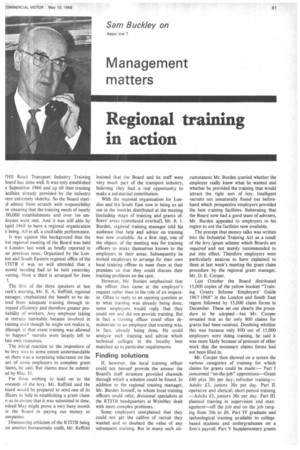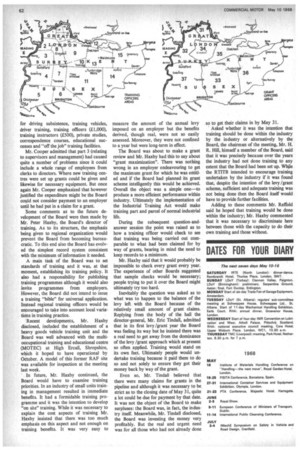Regional training in action
Page 63

Page 64

If you've noticed an error in this article please click here to report it so we can fix it.
1HE Road Transport Industry Training 3oard has done well. It was only established n September 1966 and up till then training 'acilities already provided by the industry vere extremely sketchy. So the Board start:d almost from scratch with responsibility 'or ensuring that the training needs of nearly [00,000 establishments and over Im emAoyees were met. And it was still able by kpril 1968 to have a regional organization n being. All in all, a creditable performance.
It was against this background that the irst regional meeting of the Board was held n London last week as briefly reported in our previous issue. Organized by the Lonion and South Eastern regional office of the tTITB it was so well attended that a econd meeting had to be held yesterday veiling. Now a third is arranged for June 7.
The first of the three speakers at last veek's meeting, Mr. E. A. Reffold, regional nanager, emphasized the benefit to be deived from adequate training through inTeased efficiency and therefore greater proitabifity of workers. Any employer taking m recruits inevitably became involved in raining even though he might not realize it, dthough in that event training was allowed to happen" recruits were largely left to heir own resources.
The initial reaction to the imposition of he levy was to some extent understandable out there was a surprising reluctance on the oart of some employers to complete grant laims, be said. But claims must be submited by May 31.
Far from wishing to hold on to the oroceeds of the levy, Mr. Reffold said the loard would be prepared to send one of its ifficers to help in establishing a grant claim o as to ensure that it was submitted in time. ndeed May might prove a very busy month Dr the Board in paying out money to ompanies.
Discounting criticism of the RTITB being ast another bureaucratic outfit, Mr. Reffold insisted that the Board and its staff were very much part of the transport industry, believing they had a real opportunity to make a substantial contribution.
With the regional organization for London and the South East now in being as set Out in the booklet distributed at the meeting (including maps of training and grants of-. ficers' areas reproduced overleaf), Mr. R. J. Burden, regional training manager told his audience that help and advice on training was now available. As a first step, one of the objects of the meeting was for training officers to make themselves known to the employers in their areas. Subsequently he invited employers to arrange for their own local training officer to meet them at their premises so that they could discuss their training problems on the spot.
However, Mr. Burden emphasized that the officer then came at the employer's request rather than in the role of an inspector. Often in reply to an opening question as to what training was already being done, some employers would reply that they could not and did not provide training. But in fact a training officer could often demonstrate to an employer that training was, in fact, already being done. He could analyze such training and advise which technical colleges in the locality best matched up to particular requirements.
Finding solutions
If, however, the local training officer could not himself provide the answer the Board's staff structure provided channels through which a solution could be found. In addition to the regional training manager, Mr. Burden himself, to whom local training officers could refer, divisional specialists at the RTITB headquarters at Wembley dealt with more complex problems.
Some employers complained that they could not get the calibre of recruit they wanted and so doubted the value of any subsequent training. But in many such cir
cumstances Mr. Burden queried whether the employer really knew what he wanted and whether he provided the training that would attract the right sort of boy. Intelligent recruits not unnaturally found out beforehand which prospective employers provided the best training facilities. Reiterating that the Board now had a good team of advisers, Mr. Burden appealed to employers in his region to use the facilities now available.
The precept that money talks was written into the Industrial Training Act as a result of the levy /grant scheme which Boards are required and not merely recommended to put into effect. Therefore employers were particularly anxious to have explained to them at last week's meeting the grant claim procedure by the regional grant manager, Mr. D. E. Cooper.
Last October the Board distributed 15,000 copies of the yellow booklet "Training Grants Scheme Employers' Guide 1967-1968" in the London and South East region followed by 15,000 claim forms in December. These set out clearly the procedure to be adopted—but Mr. Cooper revealed that so far only 800 claims for grants had been received. Doubting whether this was because only 800 out of 15,000 employers were doing training, he said it was more likely because of pressure of other work that the necessary claims forms had not been filled in.
Mr. Cooper then showed on a screen the various categories of training for which claims for grants could be made:— Part I concerned "on-the-job" apprentices—Grant £40 plus 30s per day; refresher training— Adults £3, juniors 30s per day. Part II operative and clerical; short-period training —Adults £3, juniors 30s per day. Part III planned training in supervision and managernent—off the job and on the job ranging from 30s to £6. Part IV graduate and technological training available to collegebased students and undergraduates on a firm's payroll. Part V Supplementary grants for driving subsistence, training vehicles, driver training, training officers (£1,000), training instructors (£500), private studies, correspondence courses, educational successes and "off the job" training facilities.
Mr. Cooper admitted that part 3 (relating to supervisors and management) had caused quite a number of problems since it could include a whole range of employees from clerks to directors. Where new training centres were set up grants could be given and likewise for necessary equipment. But once again Mr. Cooper emphasized that however justified the expenditure might be the Board could not consider payment to an employer until he had put in a claim for a grant.
Some comments as to the future development of the Board were then made by Mr. Peter Haxby, the Board's director of training. As to its structure, the emphasis being given to regional organization would prevent the Board from becoming bureaucratic. To this end also the Board has evolved the simplest record system consistent with the minimum of information it needed.
A main task of the Board was to set standards of training and it was, at that moment, establishing its training policy. It also had a responsibility for publishing training programmes although it would also invite programmes from employers. However, the Board did not intend to issue a training "bible" for universal application. Instead regional training officers would be encouraged to take into account local variations in training practice.
Recent developments, Mr. Haxby disclosed, included the establishment of a heavy goods vehicle training unit and the Board was well advanced with the multioccupational training and educational centre (MOTEC) at High Ercall, Shropshire, which it hoped to have operational by October. A model of this former RAF site was available for inspection at the meeting last week.
In future, Mr. Haxby continued, the Board would have to examine training priorities. In an industry of small units training in management resulted in immediate benefits. It had a formidable training programme and it was the intention to develop "on site" training. While it was necessary to explain the cost aspects of training Mr. Haxby insisted that there was too much emphasis on this aspect and not enough on training benefits. It was very easy to measure the amount of the annual levy imposed on an employer but the benefits derived, though real, were not so easily assessed. Moreover, they were not confined to a year but were long-term in effect.
The Board was about to make a grant review and Mr. Haxby had this to say about "grant maximization". There was nothing wrong in an employer endeavouring to get the maximum grant for which he was entitled and if the Board had planned its grant scheme intelligently this would be achieved. Overall the object was a simple one—to produce a more efficient performance within industry. Ultimately the implementation of the Industrial Training Act would make training part and parcel of normal industrial life.
During the subsequent question-andanswer session the point was raised as to how a training officer would check to see that training was being carried out comparable to what had been claimed for by way of grants, bearing in mind the need to keep records to a minimum.
Mr. Haxby said that it would probably be impossible to check every grant every year. The experience of other Boards suggested that sample checks would be necessary; people trying to put it over the Board might ultimately try too hard.
Inevitably the question was asked as to what was to happen to the balance of the levy left with the Board because of the relatively small amount of grant claims. Replying from the body of the hall the director-general, Mr. Eric Tindall, admitted that in its first levy /grant year the Board was feeling its way but he insisted there was a real need to get away from the dominance of the levy /grant approach which at present so often applied. Training would stand on its own feet. Ultimately people would undertake training because it paid them to do so and not solely to ensure they got their money back by way of the grant.
Even so, Mr. Tindall believed that there were many claims for grants in the pipeline and although it was necessary to be strict as to the closing date of May 31, quite a lot could be due for payment by that date. It was not the object of the Board to make surpluses: the Board was, in fact, the industry itself. Meanwhile, Mr. Tindall disclosed, the Board was investing the money very profitably. But the real and urgent need was for all those who had not already done so to get their claims in by May 31.
Asked whether it was the intention that training should be done within the industry by the industry or alternatively by the Board, the chairman of the meeting, Mr. H. R. Hill, himself a member of the Board, said that it was precisely because over the years the industry had not done training to any extent that the Board had been set up. While the RTITB intended to encourage training undertaken by the industry if it was found that, despite the intention of the levy /grant scheme, sufficient and adequate training was not being done then the Board itself would have to provide further facilities.
Adding to these comments Mr. Reffold said he hoped that training would be done within the industry; Mr. Haxby commented that it was necessary to discriminate here between those with the capacity to do their own training and those without.












































































































